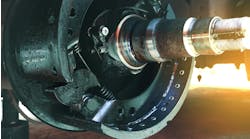We tend to talk about pre- and post-trip inspections in one breath, almost as if they are the same thing. I understand, of course, that the driver probably is using the same inspection form and following the same process to complete both the pre- and post-trip inspection, but I am going to go out on a limb and to say that of the two inspections, the post-trip may be more important than the pre-trip.
There are a couple of reasons for that view. First, post-trip inspections are completed after drivers are done driving for the day. They have been in the truck for a number of hours and, as a result, have firsthand knowledge of how the truck has been behaving and where they felt something was not quite right. Experienced drivers are especially good at being able to know when the truck does not “feel right.” And in some cases, can even offer suggestions on what they think might be wrong based on how the trucks feel to them.
With this knowledge, they may pay a little more attention to the area of the vehicle from which they suspect the problem stems. I do not mean to imply that drivers don’t give pre-trip inspections their complete attention. Most drivers give pre-trip inspections their due, but they don’t have the on-the-road knowledge to leverage during those inspections.
Secondly, a good write-up after a properly performed post-trip inspection gives the shop a chance to address the issue before the next driver needs the equipment. By contrast, should the next driver identify something not picked up by a post-trip inspection, chances are that driver has a full load of product and is ready to dispatch—less than ideal conditions for the shop to perform a thorough diagnosis and repair. Nothing is more frustrating for drivers than having to sit around at the start of their driving day waiting for their truck to be fixed because of a problem discovered during the pre-trip inspection.
To be clear, all vehicle inspections are important—even essential—to the efficient operation of the vehicles in your fleet, but I can’t help but think the post-trip has the edge because not only will you have the information from the inspection itself to use in the diagnosis, but you will also have the driver’s insight. That is a winning combination.
Gino Fontana, CTP, is COO and EVP at Transervice Logistics Inc. Prior to this recent promotion, he was VP of operations at Berkeley Division and Puerto Rico. His operational expertise emphasizes cost savings, process efficiency and improvement, superior quality, and people management skills. He has more than 35 years of experience in the transportation and logistics industry with both operational and sales experience.



